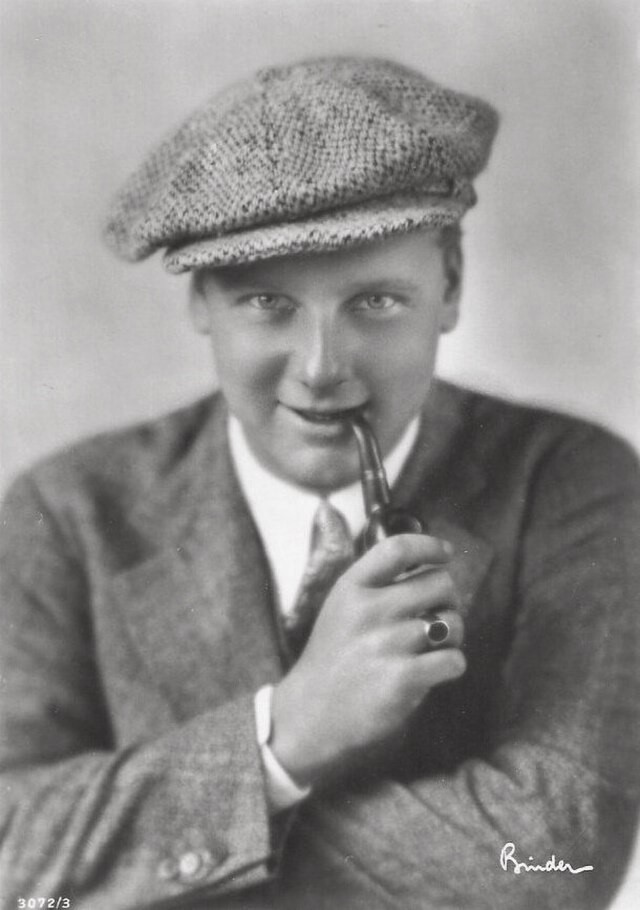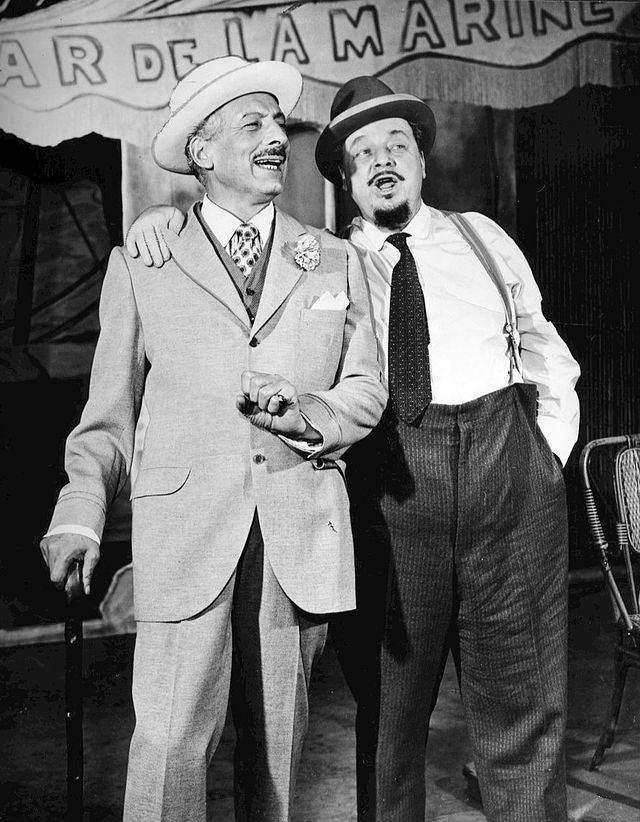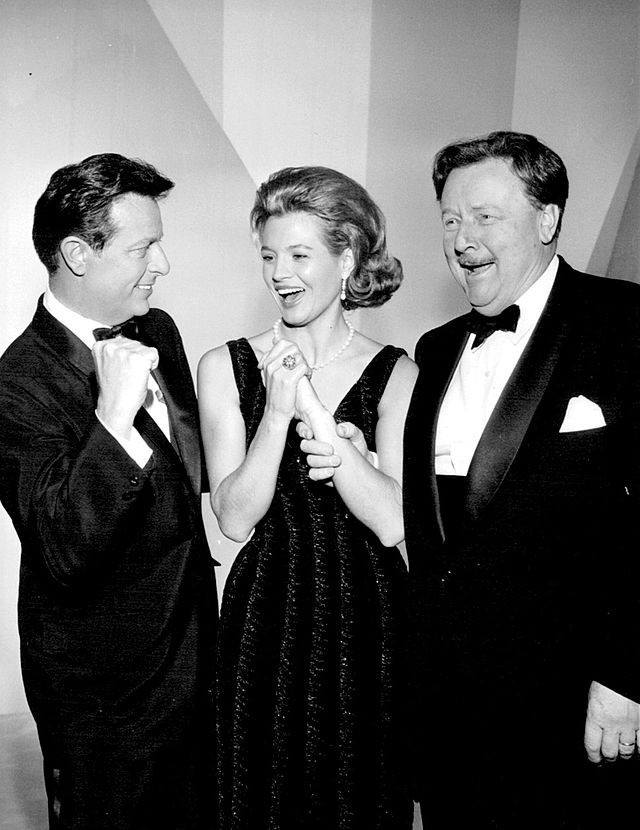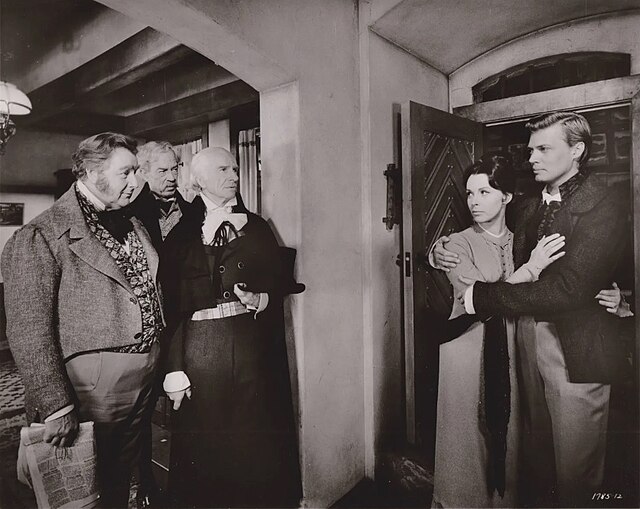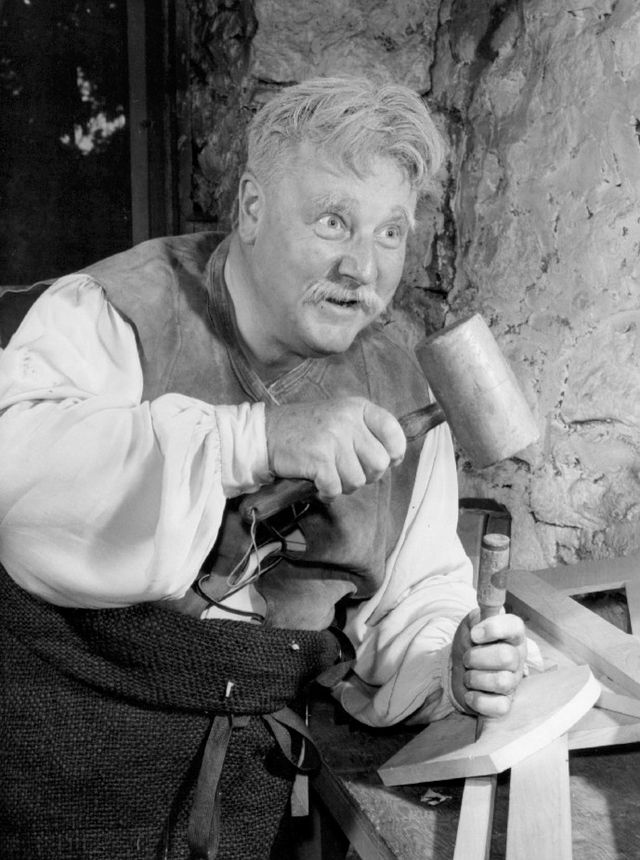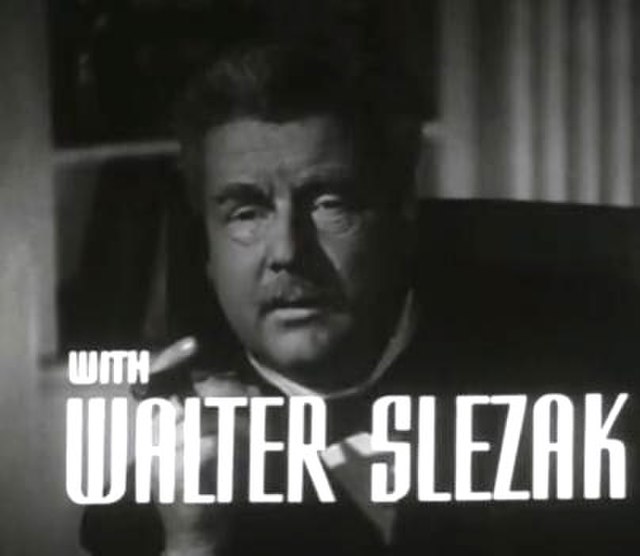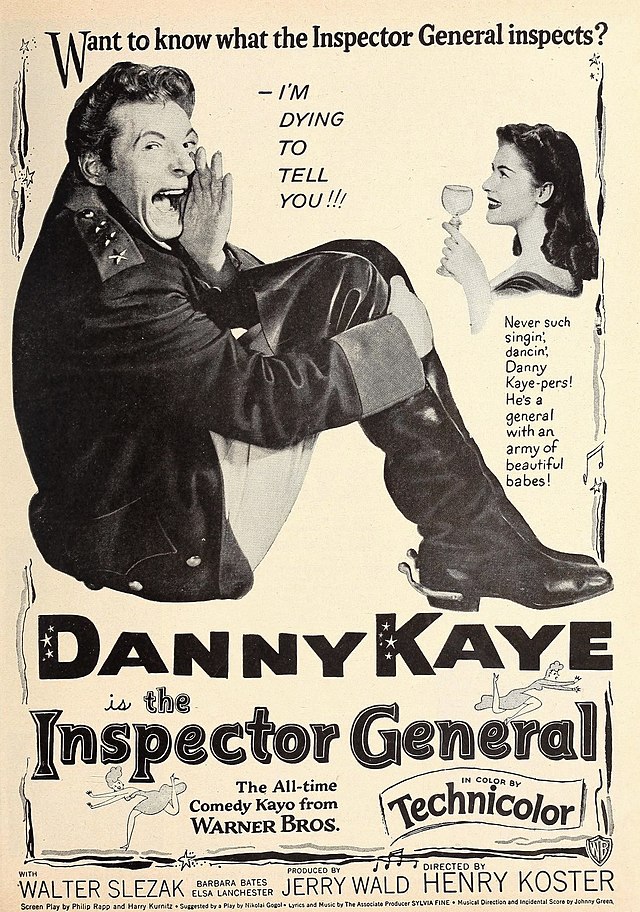Walter Slezak
back| Full Name | Walter Slezak |
| Stage Name | Walter Slezak |
| Born | May 3, 1902 |
| Birthplace | Vienna, Austria-Hungary (now Austria) |
| Died | April 21, 1983 |
| Buried | Holy Cross Cemetery, Culver City, California, USA |
| Married to | Johanna |
| Children | Erika Slezak (notable actress) - Ingrid Slezak - Leo Slezak |
| Notable films | Lifeboat (1944) - The Pirate (1948) - People Will Talk (1951) - The Inspector General (1949) |
Walter Slezak
The Charming Chameleon of Stage and Screen
Walter Slezak (1902–1983) was an Austrian-American actor known for his versatility in film, theater, and television.
His breakout role came in Alfred Hitchcock's Lifeboat (1944), where he portrayed a sinister German U-Boat captain. Equally adept at comedy and drama, Slezak shined in films like The Pirate (1948) and The Inspector General (1949).
He tragically took his own life in 1983 after struggling with health issues, leaving behind a rich legacy in entertainment.
Related
Walter Slezak (1902 – 1983)
Biography and Movie Career
Walter Slezak was born on May 3, 1902, in Vienna, Austria-Hungary (now Austria). He was the son of Leo Slezak, a renowned opera tenor, which immersed Walter into the world of performance from an early age. His mother, Elisabeth Wertheim, came from a distinguished intellectual background. Growing up in this culturally rich environment, Walter was naturally drawn to the arts. Though his father was a famous opera star, Walter initially had no aspirations to follow in his father’s footsteps.
In his youth, Slezak dabbled in various fields, including studying medicine and architecture. However, his affinity for the stage and screen quickly became apparent. He started his career in Austria, working in films during the silent era. Initially, he didn’t aspire to become an actor but, due to his natural screen presence, he found himself gravitating toward a career in film.
The Journey to Hollywood
In the 1920s, Slezak established himself in the German and Austrian film industries, but his path toward true stardom came after the political turmoil of the 1930s. As Adolf Hitler’s influence spread across Europe, Slezak, like many others in the arts, chose to flee the increasingly oppressive environment. He emigrated to the United States, leaving behind a Europe overshadowed by war.
Arriving in Hollywood in the 1930s, Slezak underwent a significant transformation. He reinvented himself from the dashing, slender young man of his early career to the rotund, jovial character actor he is best remembered as today. His breakthrough role in the U.S. came when he was cast by Alfred Hitchcock in the 1944 thriller Lifeboat. In this film, he played "Willy," a German U-Boat captain stranded at sea alongside American survivors. His portrayal of the sly and ruthless Nazi captivated audiences, and it became one of his most defining roles.
Following the success of Lifeboat, Slezak was cast in a variety of roles, showcasing his remarkable range. He could be charming and villainous in equal measure. Notably, he appeared in The Pirate (1948) alongside Judy Garland and Gene Kelly, as well as in The Inspector General (1949), a musical comedy with Danny Kaye. Slezak often played a comic foil, using his jovial personality and unique physical presence to enhance his roles.
Career Highlights
Walter Slezak enjoyed a long career, appearing in dozens of films and stage productions. His versatility enabled him to succeed in multiple genres, from drama to comedy and even musicals. Beyond Lifeboat and The Pirate, he starred in films such as People Will Talk (1951) alongside Cary Grant, and Bedtime for Bonzo (1951), a light-hearted comedy with Ronald Reagan.
His booming voice, expressive face, and larger-than-life persona made him a sought-after character actor. He also appeared frequently on Broadway, where he won a Tony Award in 1955 for his role in the musical Fanny. Throughout his career, Slezak maintained a balance between film, television, and theater, becoming a beloved figure in all three mediums.
Personal Life
Slezak married Johanna "Kaasi" Van Rijn, a Dutch-born woman, in 1943. The couple had three children together: Erika, Ingrid, and Leo. His daughter Erika Slezak followed in his footsteps and became a well-known actress, notably for her long-running role on the soap opera One Life to Live.
Slezak was known for his genial personality off-screen as well, often described as warm, witty, and deeply dedicated to his family. His daughter Erika often recalled that her father was both fun and fiercely intelligent, capable of charming anyone with his humor and storytelling.
Walter was also a lover of literature and music, passions that remained with him throughout his life. He was an accomplished linguist and frequently read in multiple languages. His intellectual pursuits extended beyond acting, and he enjoyed spending his free time surrounded by books, music, and art.
Later Years and Death
In his later years, Slezak remained active, working in both film and television well into the 1970s. However, the final years of his life were marked by declining health, and he faced a number of personal challenges, including financial difficulties.
On April 21, 1983, Walter Slezak tragically took his own life. He had been suffering from a variety of health problems and reportedly became despondent over his inability to continue his acting career. His death shocked many in the entertainment industry, as he was known as a man of great humor and optimism. He left behind a legacy of memorable performances, not only in film but also in theater and television.
Walter Slezak was laid to rest at Holy Cross Cemetery in Culver City, California, where many Hollywood luminaries are buried. His contributions to cinema, particularly in his ability to bring both depth and humor to his roles, remain a significant part of his legacy.
Legacy
Walter Slezak is remembered for his versatility as an actor, from his portrayal of sinister villains to his warm, comedic roles. His work in Lifeboat is particularly iconic, but his range and talent allowed him to leave an indelible mark across multiple genres and industries. His daughter, Erika Slezak, continued the family's acting legacy, further cementing the Slezak name in the annals of entertainment history.
In addition to his film and theater work, Slezak’s autobiography, What Time's the Next Swan? (1962), provided fans with a humorous and insightful glimpse into his life, career, and personal philosophies. His wit, generosity, and passion for his craft remain fondly remembered by those who worked with him and by audiences who continue to enjoy his films.
A Tribute to Walter Slezak
Analysis of Walter Slezak’s Acting Style
Walter Slezak’s acting style was a unique blend of charm, wit, and versatility, underpinned by a striking physical presence and a natural talent for embodying both comedic and villainous characters. His ability to adapt to different genres—whether in light-hearted musicals, swashbuckling adventures, intense thrillers, or dramatic war films—was a hallmark of his career.
Physicality and Presence
One of the first things that stood out about Walter Slezak’s performances was his imposing physical presence. As he transitioned from his early days as a slender leading man in Europe to a more rotund figure in Hollywood, Slezak embraced his physicality, using it to enhance his characters. His size and facial expressions were integral to the roles he portrayed, particularly in comedic or villainous roles. In comedies, his bulk often contrasted with his nimble wit, allowing him to play the lovable buffoon or the self-important figure who is often the butt of jokes. In more sinister roles, like in Lifeboat (1944), his size added to the menacing aura of the characters he played, making him an imposing and memorable screen presence.
Versatility in Tone
Slezak’s versatility was one of his most defining characteristics. He could effortlessly shift between light-hearted and dark roles, often within the same film. His range allowed him to play both comic relief and menacing villains with equal finesse. For example, in The Inspector General (1949), he portrayed the corrupt mayor of a small town with a bumbling charm that was both humorous and endearing. On the other hand, in Lifeboat, his portrayal of the ruthless German U-Boat captain was chillingly methodical, a stark contrast to his more comedic roles.
Slezak was adept at using his vocal inflections and facial expressions to suit the tone of the film. He could exude warmth and avuncular charm in one scene, only to shift into cold, calculating menace in another. His deep, rich voice allowed him to command attention, whether delivering a comedic punchline or plotting a villainous scheme.
Mastery of Humor
Humor was a key component of Slezak’s acting style, and he had a remarkable ability to inject levity into a scene without overpowering it. His comedic timing was impeccable, whether he was delivering a witty line, playing a bumbling sidekick, or engaging in physical comedy. His larger-than-life personality added to the sense of fun in his comedic roles, making him a memorable presence in films like The Pirate (1948) and The Princess and the Pirate (1945).
He often played characters who appeared pompous or arrogant on the surface but were, in fact, lovable and harmless underneath. Slezak had a self-deprecating charm, and he was unafraid to play the fool or poke fun at himself. This ability to balance his physicality with light-hearted humor made him a favorite in many comic roles, particularly in musicals and comedies, where his jovial nature shone through.
Complexity in Villainous Roles
Despite his success in comedies, Slezak was equally adept at playing villains. What set him apart from other actors in these roles was the depth he brought to his antagonists. Rather than playing one-dimensional “bad guys,” Slezak infused his villainous characters with intelligence, cunning, and often a dark sense of humor. In Lifeboat, his portrayal of Willy, the German U-Boat captain, was chilling not just because of his physical presence but because of his calm, almost genteel demeanor, which masked his ruthlessness. He portrayed Willy as methodical and calculated, avoiding overt displays of aggression in favor of subtle manipulation, which made the character even more sinister.
Even when playing more exaggerated villains, Slezak found ways to humanize them. His characters were rarely pure evil; they often had quirks, vulnerabilities, or motivations that made them more complex than the typical movie villain. This added layer of complexity allowed audiences to connect with his characters, even if they were the antagonists.
Linguistic and Cultural Versatility
Fluent in multiple languages, Slezak's linguistic prowess also influenced his acting style. His fluency in English, German, French, and other languages gave him a unique ability to move seamlessly between European and American cinema. His Austrian-German accent, which he carried throughout his career, became a defining feature of his roles, particularly in Hollywood. This accent, combined with his European mannerisms, made him a natural fit for roles requiring foreign sophistication or exoticism, often cast as European aristocrats, diplomats, or charming rogues.
Slezak’s multicultural background allowed him to play characters from different nationalities with authenticity. He could imbue his performances with a sense of worldly knowledge and sophistication, which set him apart from other actors of his time.
Theatricality and Stage Influence
Walter Slezak's experience on the stage, particularly his Tony Award-winning performance in Fanny (1955), informed his acting style. There was a certain theatricality in his performances, particularly in his use of gestures and facial expressions. This stage presence translated well to the screen, where he could command attention even in small, supporting roles. His ability to engage the audience through his expressions and voice was a key element of his style, allowing him to stand out even in ensemble casts.
Slezak’s voice was a powerful tool, and he used it effectively, whether to deliver a heartfelt monologue, a sinister plot, or a witty retort. His booming, melodious tone could be both commanding and comforting, adding layers to the characters he portrayed. His theatrical training also made him particularly skilled in musicals, where his vocal abilities were put to use in both comedic and dramatic numbers.
The Balance of Light and Dark
One of the most striking aspects of Slezak’s acting style was his ability to balance light and dark elements within the same character. He could switch between comedy and drama with ease, making his characters feel more nuanced and real. In films like The Pirate or People Will Talk, he could be charming and affable, yet there was often an underlying seriousness or complexity to his characters. This duality made him a compelling actor to watch, as audiences were never quite sure whether to trust or fear his characters.
Walter Slezak’s acting style was defined by his versatility, physical presence, and ability to navigate the full emotional spectrum, from comedy to villainy. His commanding voice, expressive face, and European sophistication gave him a distinctive edge in Hollywood. Whether playing the charming fool or the calculating villain, Slezak’s performances were always infused with depth, humor, and a sense of authenticity. He brought humanity to his roles, making even the most outlandish or sinister characters feel real and relatable. His legacy as a beloved character actor endures, remembered for his ability to seamlessly blend humor, warmth, and menace on screen.
Personal Quotes from Walter Slezak
On Acting and the Entertainment Industry:
- "Every actor has a natural animosity toward every other actor, present or absent, living or dead."
This quote reflects Slezak’s humorous and self-aware view of the competitive nature of the acting profession. It showcases his ability to poke fun at the egos and insecurities that often come with being in the entertainment industry. - "An actor's a guy who, if you ain't talking about him, ain't listening."
This is another witty comment on the self-centeredness that often comes with the acting profession. Slezak, with his characteristic humor, acknowledged the narcissism many actors possess.
On His Physical Transformation and Career Shift:
- "I was not considered an ideal juvenile. But my face went with the part of a rotund and hearty scoundrel."
Slezak often reflected on how his physical appearance, particularly after gaining weight, led to a shift in the types of roles he was cast in. His ability to embrace these roles with charm and depth turned him into a memorable character actor. - "I was skinny, but I wanted to become an opera singer like my father. They said I’d never make it as an opera singer, so I made sure I ate enough to disqualify me completely."
With this tongue-in-cheek explanation, Slezak acknowledged his decision to give up his ambitions of following in his famous father Leo Slezak’s footsteps as an opera singer, instead embracing acting as his primary career.
On Life and Humor:
- "I used to think I was poor. Then they told me I wasn’t poor, I was needy. Then they told me it was self-defeating to think of myself as needy, I was deprived. Then they told me deprived was a bad image, I was underprivileged. Then they told me underprivileged was overused, I was disadvantaged. I still don’t have a dime. But I have a great vocabulary."
This humorous reflection on poverty and societal labels shows Slezak’s ability to find humor in life's challenges. It also illustrates his wit and intelligence in dealing with complex social issues.
On His Legacy:
- "I was destined to be a tramp, but I became an actor."
This quote humorously reflects his belief that fate could have led him down many paths, but he embraced acting as his calling. It encapsulates his humble, self-deprecating humor and how he viewed his career with a lighthearted perspective.
What Others said about Walter Slezak
Alfred Hitchcock (Director of Lifeboat):
Alfred Hitchcock, who directed Slezak in one of his most famous roles as the villainous German U-Boat captain in Lifeboat (1944), praised Slezak's ability to bring depth to a complex character. Hitchcock is believed to have appreciated Slezak’s subtlety and ability to humanize even a sinister figure, commenting on his talent for combining menace with intelligence.
- "Walter had that wonderful quality of menace that was made even more chilling by his charm. He could make evil seem almost reasonable."
Erika Slezak (His Daughter and Acclaimed Actress):
Erika Slezak, his daughter who became a renowned actress in her own right, particularly known for her long-running role on the soap opera One Life to Live, often spoke about her father with deep affection and respect. She admired his wit, intelligence, and professionalism and remarked on his passion for both life and acting.
- "My father was not only a brilliant actor, but a brilliant man. He had this innate ability to make everyone feel at ease with his humor, and yet, he could turn on this incredible depth when the role called for it. He was my inspiration."
Danny Kaye (Actor and Co-star in The Inspector General):
Danny Kaye, who worked alongside Slezak in The Inspector General (1949), appreciated Slezak’s comedic timing and ability to play the perfect foil in their scenes together.
- "Walter was a master of comic timing, and working with him was always a joy. He knew how to elevate a scene, how to play it just right to get the best laugh or the most tension. And he did it all with such ease."
Judy Garland (Co-star in The Pirate):
Judy Garland, who starred with Slezak in The Pirate (1948), was reportedly fond of his kindness and professionalism. Slezak’s easygoing nature and sense of humor made him a favorite on set, and Garland appreciated how his larger-than-life personality was always accompanied by warmth and generosity.
- "Walter was such a dear man. He was one of the most generous actors I’ve ever worked with—both on and off-screen. He had this presence that could make the whole room feel alive with laughter."
Gene Kelly (Co-star in The Pirate):
Gene Kelly, who also starred alongside Slezak in The Pirate, praised Slezak's comedic sensibility and his dedication to his craft. Kelly admired Slezak’s ability to transition smoothly between humorous and serious moments within a film.
- "Walter could play it straight or funny without missing a beat. He had a way of understanding the rhythm of a scene that made him a perfect partner in comedy. He always knew when to pull back or go big, and that’s a rare gift."
Critics on His Versatility:
Film critics frequently praised Slezak for his wide-ranging abilities as an actor. Whether he was playing a villain or providing comic relief, his performances were often singled out as highlights of the films in which he appeared.
- Bosley Crowther, the influential film critic for The New York Times, once wrote of Slezak:
- "Walter Slezak is an actor of rare wit and warmth, capable of infusing even the darkest roles with a human touch. His performances are consistently magnetic, whether he's the villain or the jester."
Colleagues on His Generosity:
Fellow actors often remarked on Slezak’s generosity as a scene partner. He was known for not trying to steal the spotlight but rather enhancing the work of those around him. His ability to balance his performances so that everyone in the scene could shine was something his peers admired.
- "Walter was a true actor's actor. He knew when to step back and let others shine. There was never any ego about him—just a love for the craft."
(Reported by a Broadway co-star in Fanny)
His Reputation in the Theater Community:
In the theater world, especially after his Tony Award-winning performance in Fanny, Slezak was remembered as a consummate professional who brought the same energy and commitment to the stage that he did to film. His voice, presence, and ability to engage the audience made him a standout in live performances.
- "Walter brought a warmth to the stage that few could match. You always knew that when he walked on, something special was going to happen."
(Fanny director Joshua Logan)
Fans and Public Perception:
Many fans appreciated Slezak for his jovial, larger-than-life persona, which often transcended the characters he played. He had a kind of everyman charm that made him approachable, even when playing complex or antagonistic roles. Fans loved the way he could inject humor into any situation while still delivering strong performances.
- "Walter Slezak was one of those rare actors who made you feel like you were in on the joke, whether he was being funny or deadly serious."
(Los Angeles Times reader letter after his passing)
Awards and Recognition
Tony Award (1955)
- Award: Tony Award for Best Performance by a Leading Actor in a Musical
- Work: Fanny
- Recognition: This is perhaps Slezak’s most significant recognition in his career. He won this prestigious award for his role as "Panisse" in the Broadway musical Fanny, which opened in 1954 and became a hit. The musical, based on Marcel Pagnol's trilogy, was a blend of romance, drama, and comedy, and Slezak's portrayal of the wealthy yet kind-hearted Panisse was lauded for its warmth and humor. The role showcased his vocal talent and his ability to bring emotional depth to a larger-than-life character.
Golden Globe Nomination (1948)
- Award: Golden Globe Nomination for Best Supporting Actor
- Work: The Pirate (1948)
- Recognition: Slezak was nominated for a Golden Globe for his performance in The Pirate, a musical comedy starring Judy Garland and Gene Kelly. In the film, Slezak played Don Pedro Vargas, an eccentric wealthy man with comedic quirks, and his performance was praised for its charm and humor. While he didn’t win the award, the nomination highlighted his ability to stand out even among Hollywood heavyweights.
Walk of Fame Star (1960)
- Recognition: Star on the Hollywood Walk of Fame
- Location: 6618 Hollywood Blvd, Los Angeles, California
- Recognition: Slezak was honored with a star on the Hollywood Walk of Fame in 1960 for his contributions to the motion picture industry. This recognition cemented his legacy as a respected and beloved actor in Hollywood. His star remains a symbol of his enduring impact on the film industry.
Broadway World Award (Honorary)
- While not a specific award category, Slezak's reputation on Broadway, particularly for his work in Fanny, earned him widespread respect in the theater community. His charismatic stage presence and vocal abilities in musical theater, along with his Tony win, have been commemorated in various theater-related honors and retrospectives in the years following his death.
German Film Recognition
- Before emigrating to the United States, Slezak was recognized in the German-speaking film industry for his early work in Austrian and German cinema during the 1920s and 1930s. While not officially awarded by any prominent institutions at the time, his performances in German films like The Trunks of Mr. O.F. (1931) and The Csardas Princess (1926) were well-received, and he was a popular actor in pre-World War II European cinema.
Posthumous Recognition
- Lifetime Achievement Recognition: After his death in 1983, Slezak’s legacy was honored through various film retrospectives, particularly for his work in Lifeboat (1944), directed by Alfred Hitchcock. Film historians and critics have often cited his portrayal of Willy, the German U-Boat captain, as one of his finest performances, and his ability to play a complex villain has been studied in film literature.
Legacy and Honors
- Autobiography: Slezak’s autobiography, What Time's the Next Swan?, published in 1962, received critical acclaim for its wit and insight. The book was a reflection of his humor, intellect, and reflections on his career, earning praise from both readers and fellow actors.
- Stage and Screen Tribute Events: After his death, various stage and screen organizations paid tribute to his legacy with special events and screenings of his films. His contribution to both Broadway and Hollywood, as well as his versatility, has been celebrated in industry tributes and retrospectives.
Movies featuring Walter Slezak
1920s
- 1922: Sodom und Gomorrha
An early silent Biblical epic, portraying the destruction of the ancient cities of Sodom and Gomorrah. This film was one of Walter Slezak's first on-screen appearances. - 1923: The Green Manuela (Die Grüne Manuela)
Set in Spain, this romantic drama revolves around love, jealousy, and social status. Slezak played a supporting role as he was establishing himself in European cinema. - 1926: The Csardas Princess (Die Czardasfürstin)
A romantic comedy about the relationship between a wealthy count and an opera singer, exploring themes of social class differences.
1930s
- 1930: The Great Longing (Das Große Sehnen)
A German musical comedy about romantic entanglements and misunderstandings, Slezak played a supporting role. - 1931: Ronny
A romantic comedy where the protagonist must deal with misunderstandings and mistaken identities in the world of a circus. - 1931: The Opera Ball (Der Opernball)
A musical comedy about the chaos and confusion that arise at a grand Viennese opera ball. - 1931: The Trunks of Mr. O.F. (Die Koffer des Herrn O.F.)
A satirical German film in which a mysterious man leaves trunks in a small town, causing a social and political upheaval. - 1932: Frederica (Friederike)
A historical romance about the life and love of composer Ludwig van Beethoven, with Slezak in a supporting role. - 1932: Impossible Love (Unmögliche Liebe)
A melodrama about a love affair challenged by societal expectations. - 1933: The Hymn of Leuthen (Der Choral von Leuthen)
A historical drama set during the Seven Years' War, depicting the famous Prussian victory at the Battle of Leuthen. - 1933: Gypsy Blood (Der Zigeunerbaron)
A musical comedy based on the popular operetta The Gypsy Baron by Johann Strauss II, set in 18th-century Hungary.
1940s
- 1942: Once Upon a Honeymoon
A romantic war drama where a newlywed couple, caught up in the early days of World War II, must navigate love and espionage. Slezak played a Nazi spy in this Cary Grant and Ginger Rogers film. - 1943: This Land is Mine
A wartime drama directed by Jean Renoir about life in a Nazi-occupied French village. Slezak played a supporting role as the collaborator and villain. - 1944: Lifeboat
Directed by Alfred Hitchcock, Lifeboat is set entirely on a lifeboat in the middle of the ocean during World War II. Slezak plays Willy, the cunning German U-Boat captain who tries to manipulate the survivors. - 1945: The Princess and the Pirate
A swashbuckling comedy starring Bob Hope and Virginia Mayo. Slezak plays the bumbling pirate La Roche, providing comedic relief. - 1946: Sinbad the Sailor
A Technicolor adventure film in which Slezak plays the villainous Emir of Daibul, who battles Sinbad, played by Douglas Fairbanks Jr. - 1947: The Fabulous Texan
A Western about a former Confederate soldier who becomes an outlaw after the Civil War, featuring Slezak as a corrupt politician. - 1948: The Pirate
A musical comedy co-starring Judy Garland and Gene Kelly. Slezak plays Don Pedro Vargas, a wealthy, eccentric local who vies for the affection of Garland's character. - 1949: The Inspector General
A musical comedy in which Slezak stars as the scheming mayor of a corrupt town, terrified of an impending government inspection. Danny Kaye stars as the mistaken inspector general.
1950s
- 1950: The Yellow Cab Man
A slapstick comedy starring Red Skelton. Slezak plays an insurance agent, adding humor to the film’s plot about a cab driver inventing a new type of bumper. - 1950: Abbott and Costello in the Foreign Legion
Slezak appears as a villain in this comedy, which involves the famous duo joining the French Foreign Legion. - 1951: People Will Talk
A thoughtful romantic drama starring Cary Grant as a doctor who must defend his medical ethics. Slezak plays the charming but eccentric colleague of Grant’s character. - 1951: Bedtime for Bonzo
A light-hearted comedy where Ronald Reagan plays a professor who tries to teach morals to a chimpanzee named Bonzo. Slezak plays the amusing villain, Professor Hans Neumann. - 1952: Captain Pirate
A swashbuckling adventure film in which Slezak plays Sir Henry Morgan, a pirate-turned-governor, who helps the hero clear his name. - 1952: Diplomatic Courier
A Cold War thriller starring Tyrone Power as a U.S. agent. Slezak plays a scheming double agent. - 1954: Malaga (aka Fire Over Africa)
A romantic adventure where Slezak plays a diamond smuggler, adding tension and intrigue to the plot. - 1955: The Girl Rush
A musical comedy about a woman inheriting a Las Vegas casino. Slezak provides comedic moments as the quirky character Maxie.
1960s
- 1960: That Naughty Girl (Cette sacrée gamine)
A French-Italian musical comedy where Slezak plays an important supporting role. - 1963: The Prize
A thriller about a Nobel Prize-winning author, played by Paul Newman, who becomes entangled in a Cold War conspiracy. Slezak plays a sinister European official. - 1963: Come Fly with Me
A romantic comedy about three flight attendants looking for love. Slezak plays a wealthy European gentleman who falls for one of the women. - 1966: The Singing Nun
A musical drama inspired by the true story of the Belgian nun who becomes an international music sensation. Slezak plays Father Clementi.
1970s
- 1970: Black Beauty
A family film adaptation of the classic novel by Anna Sewell, in which Slezak plays the eccentric landowner Mr. Barry, who provides some comic relief. - 1970: Crooks and Coronets
A British comedy caper about two ex-convicts who attempt to pull off a heist. Slezak plays a wealthy aristocrat whose estate becomes the target. - 1974: Murder on the Emerald Seas
A zany comedy set on a cruise ship where a beauty pageant takes place, and a murder mystery unfolds. Slezak plays a shady figure in the competition.

